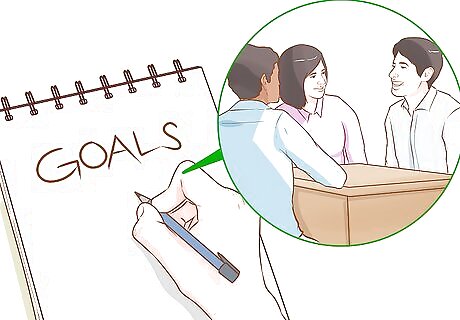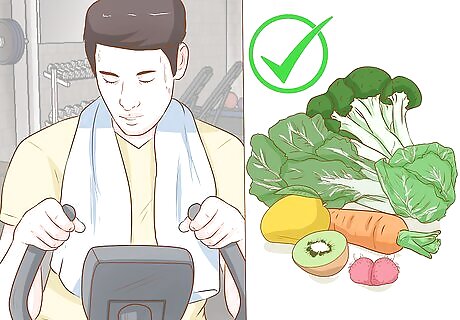
views
Being Patient with Your Partner

Consider your partner’s feelings. If you are patient and kind with your partner, they will feel loved and adored. If you are impatient and intolerant, your partner is likely to feel rejected by you. Your actions and reactions can have a direct effect on how your partner feels, so think about this when you’re feeling impatient or frustrated. Remember that you care about your partner deeply and don’t want to hurt them. For example, if your partner forgets to stop and buy milk, saying “That’s okay, we’ll just get it later,” shows that you understand it was a simple mistake. If you instead say something like “I can’t believe you did this again. You always forget everything,” you are implying that your partner is flawed and that their mistakes are unacceptable. Remember, a little mistake like this isn’t the end of the world.

Buffer your responses. It’s normal to turn immediately to an impatient response; many people assume that mistakes or inconveniences are the result of other people’s incompetence and carelessness. This is a pretty bleak outlook to have on those around you, though, and may lead you to say hurtful things before you even realize it. A great way to break this habit is to use a buffer to force yourself to think before responding. For example, you could make it a personal rule that when something frustrating happens, you take three deep breaths before you say anything at all. This will give you time to process the situation and respond appropriately. You’ll probably realize that what you thought was a huge mistake actually isn’t that big of a deal, and you can downgrade your response from angry to understanding. In a more serious situation, you could leave the room or go for a walk. This will allow you time to cool down and think about your reaction. EXPERT TIP Klare Heston, LCSW Klare Heston, LCSW Licensed Social Worker Klare Heston is a Licensed Independent Clinical Social Worker based in Cleveland, Ohio. With experience in academic counseling and clinical supervision, Klare received her Master of Social Work from the Virginia Commonwealth University in 1983. She also holds a 2-Year Post-Graduate Certificate from the Gestalt Institute of Cleveland, as well as certification in Family Therapy, Supervision, Mediation, and Trauma Recovery and Treatment (EMDR). Klare Heston, LCSW Klare Heston, LCSW Licensed Social Worker Try simple exercises to help improve your patience. Klare Heston, a Licensed Clinical Social Worker, suggests: “Practice counting to 10 or 15 before you do a certain activity, like sitting in your car before starting it. If you practice patience in different aspects of your own life, it will be easier to transfer that to your relationships, in which patience is very important.”

Have realistic expectations. Patience will come along with understanding, and one of the most important things to understand about your partner is that they’re not perfect. They can’t be! When you set unrealistic expectations for your partner or decide that things absolutely must go a certain way, you will inevitably be disappointed. This disappointment will lead to impatience and frustration in the relationship. You can avoid this by simply having reasonable expectations for your partner. An example of an unreasonable expectation might be thinking that your partner should be home at exactly 5:30 every day, even though they have a 25-minute commute and work until 5:00. This leaves little to no time to account for things like walking to the car, or changes in traffic, and ultimately sets your partner up to fail. Try instead to hold a more reasonable expectation, like expecting your partner to let you know if they get held up or will be late getting home for some reason. Another example: expecting your significant other to always want to watch the same shows as you. Instead, you could expect that they allow you to choose some of the time, and you allow them to choose other times. Compromise and understanding are keys in any relationship.

Look at your partner as a whole. Remember that no relationship will ever be perfect. There will inevitably be points of tension between you and your partner from time to time, and that’s okay. Instead of letting this tension define your relationship during those times, always keep in mind the things you love about your partner. When you see your partner as a whole, it is easier to be patient through stressful times. For example, if your partner does something that really annoys you, like tapping their foot, do not let that pet peeve take precedence over all of the good qualities that you love in your partner. You might also notice that some expressions your significant other uses often seem repetitive to you. Keep in mind that you are likely around them more than anyone else, and that you hear their stories and phrases more, too. Remember that these things are part of the whole person that you fell in love with, and aren’t such a big deal in the long run.
Being Patient with Yourself

Give it time. Learning to be patient takes--wait for it--patience. If you are easily frustrated, that isn’t likely to change overnight, and being hard on yourself will only add to your frustration. Instead, recognize that you are working toward being more patient and forgive yourself for any mistakes that you make along the way. If you’re putting in sincere effort, you deserve to be given a break once in a while, especially from yourself. For example, if you get frustrated sitting in traffic, recognize that you are frustrated and try to calm down. Take some deep breaths, then let it go. There is no need to be frustrated about being frustrated!

Set goals. This will give you can a clear definition of how you are succeeding. Each goal you reach will help motivate you to reach the next. Be proud of the progress you make when you hit each goal and use that energy to push you to your next one. Some examples of goals that lead to being more patient might be things like: Waiting in line without being frustrated. Keeping a positive attitude with co-workers. Overlooking things that your significant other does that you find annoying.

Remind yourself that patience will pay off. Because it will! Being patient benefits you in many ways. First, it helps keep your relationships more loving and respectful and allows you to be calmer and more at peace in general. When you start to feel frustrated, keep in mind that responding with patience will help you live a more satisfying life. You’re in this for the long haul, so don’t get distracted by minor frustrations along the way.

Practice positive self-talk. Listen to the inner dialogue that plays out in your mind all day long. This is your “self-talk.” Your self-talk can tear you down just as easily the things other people say, or it can boost your confidence. When you analyze yourself and think (or talk) to yourself about being patient, focus on your progress in a positive way. It’s easy to get frustrated when you’re angry, but positivity will help you calm down and approach things rationally. For example, avoid thoughts like “I’m just not patient enough to deal with that.” Instead, frame it in a positive by thinking or saying something like “Dealing with that is going to require a lot of patience. I can do it if I take my time and control my emotions.”
Practicing Patience Everyday

Be aware of your stress. Understand your stress levels and what stressors affect you the most. Try keeping a journal of these top stressors and how they make you feel. As you come to understand your triggers, you can better control your stress. Having your stress under control will allow you to focus on being a more patient person. Traffic Long lines Excessive phone calls Deadlines

Remain positive. Most situations can be looked at in a positive and negative light. How patient you are in a given circumstance will depend on how positive or negative your outlook is. If you focus on the positive aspects of a situation, you’ll find yourself being much more patient. For example, if you view time spent sitting in traffic as time wasted, you will be frustrated and impatient. Instead, reframe the situation. Sure, you spent a long time in traffic, but it was a great opportunity to have a conversation with your significant other. With this subtle twist, the experience becomes a positive one and you will both be more patient.

Have a plan for tough situations. Being caught off guard is stressful, regardless of the situation. You can be more patient if you prepare yourself for difficult situations. One of the best ways to prepare for a situation is to visualize yourself dealing with it before it happens. Close your eyes and think about how the situation will play out, then how you want to react to it. Breathe deeply and tell yourself that you can do it. For example, if you get irritated when your significant other sleeps in on the weekend, visualize yourself doing something you enjoy in the morning. Include in the visualization how you will greet your significant other warmly when they wake up, maybe with a plate of pancakes ready or a bowl of fresh fruit prepared.

Keep your body healthy. Exercise and a healthy diet can keep your body healthy. This will make you feel better, raise your self-confidence, and help to balance your hormones and neurotransmitters (the chemicals that send messages throughout your brain and body). All of these things will make your hormones work for you to reduce your stress level and help you to be more patient.

Focus on your mental health. Of course, physical health is not the only factor to remaining happy and stable. If you practice good mental hygiene, you will find that you have much more capacity to be patient with yourself and your significant other. Practicing yoga, meditation, deep breathing techniques, and talking in support groups can help you relieve built up stress and maintain your cool at all times.



















Comments
0 comment